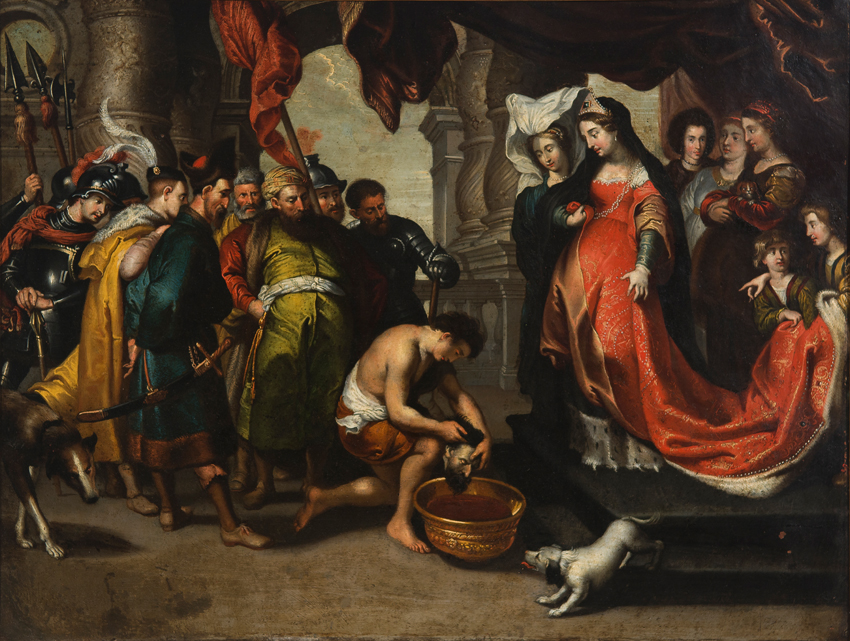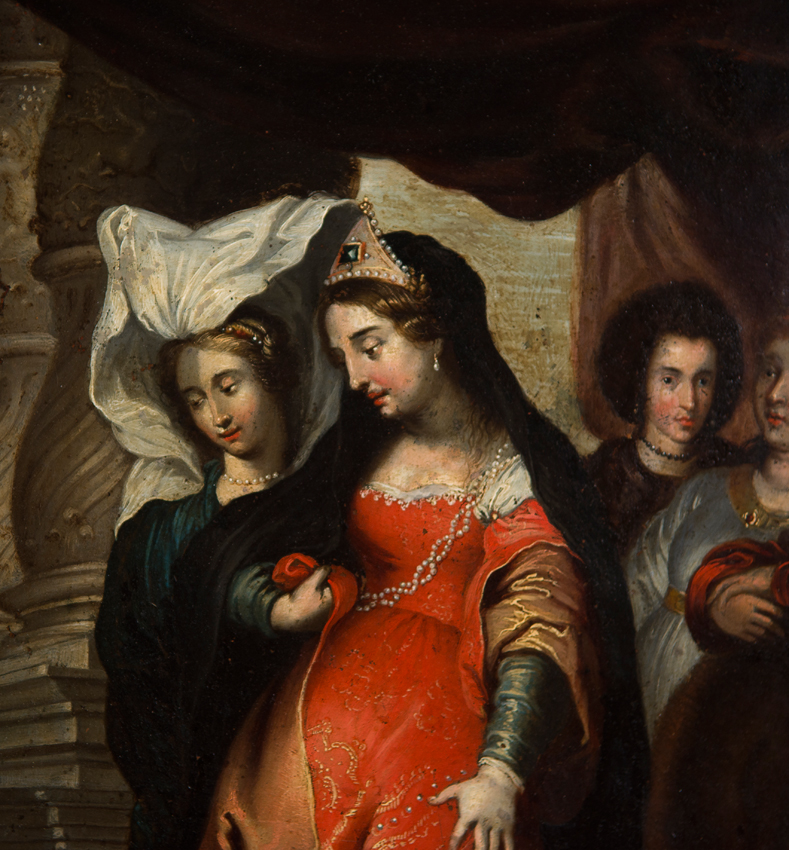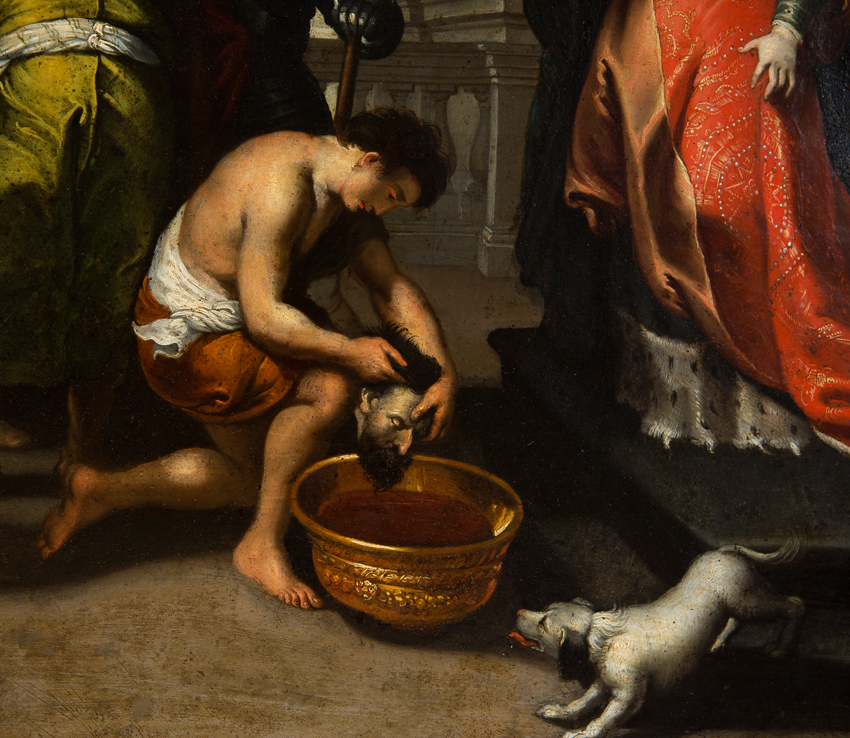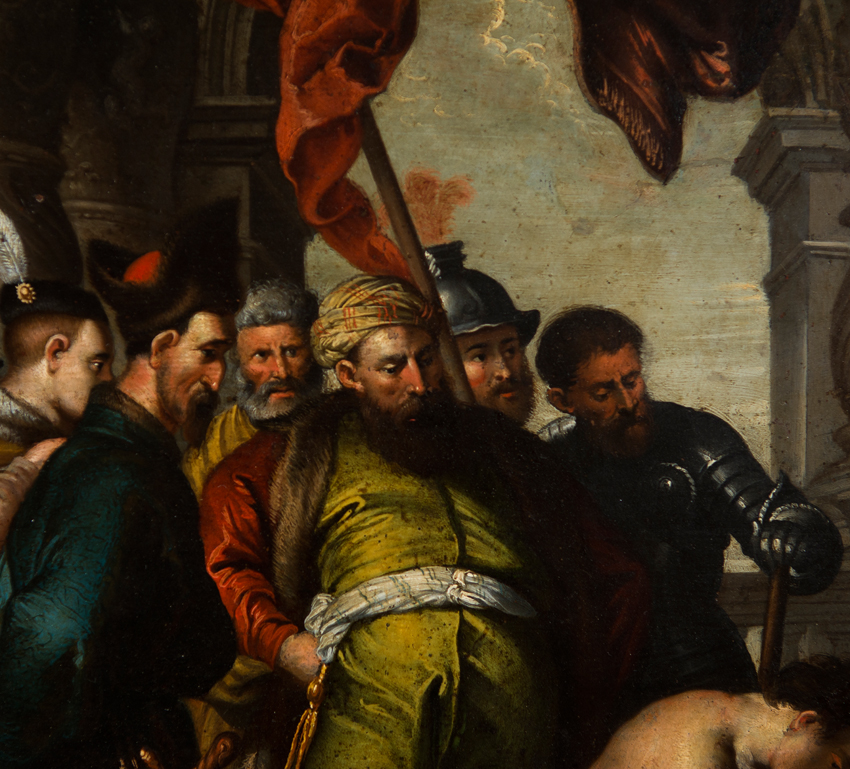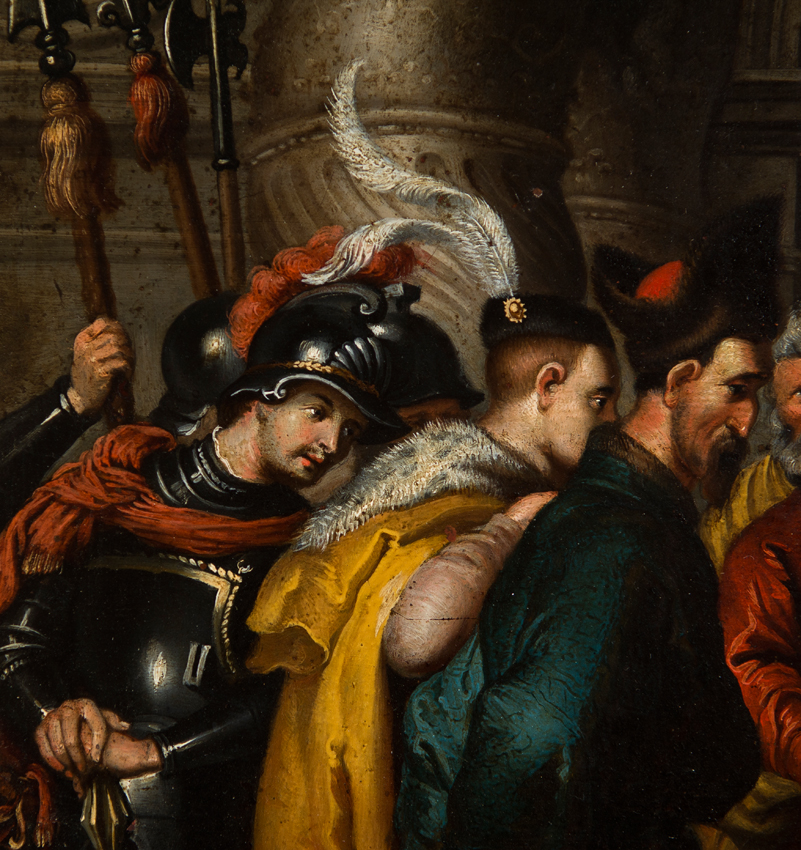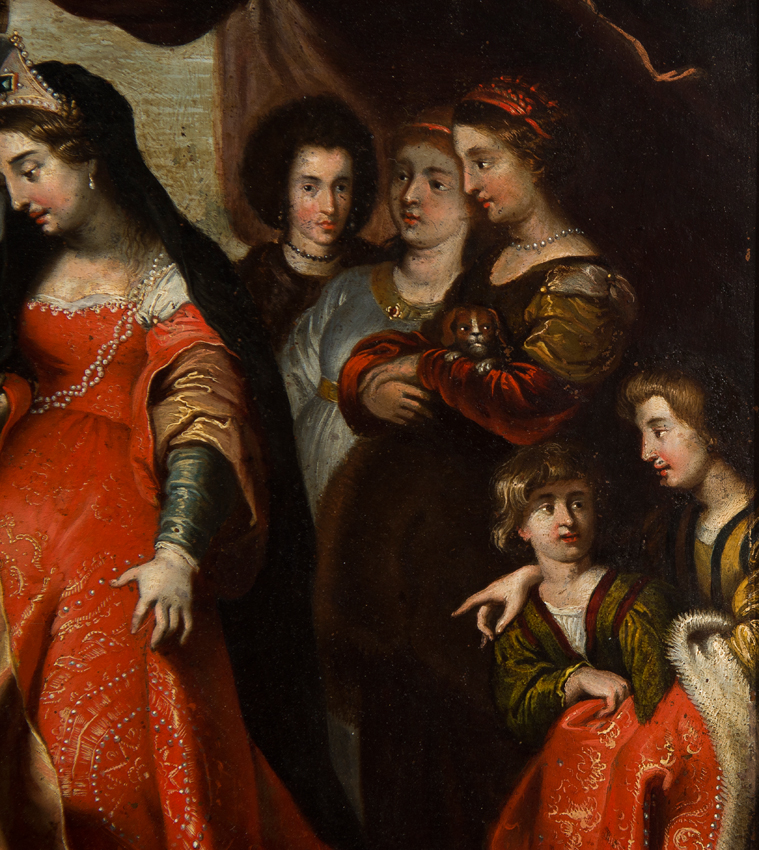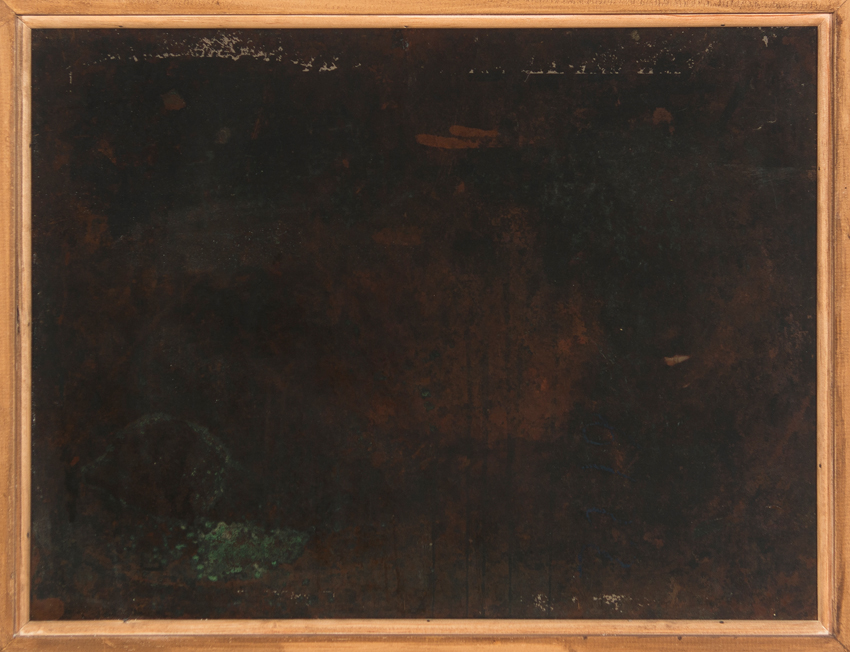23
Flemish School follower of Peter Paul Rubens. 17th century.
Flemish School follower of Peter Paul Rubens. 17th century.
"Head of Cyrus brought to Queen Tomyris"
Oil on copper. 43 x 57 cm.
The painting is based on Rubens' "Head of Cyrus brought to Queen Tomyris," which is kept in the Museum of Fine Arts, Boston.
One of the most remarkable tales of women in warfare is the story of the queen of the Massagetae, Tomyris, who defeated none other than Cyrus the Great.
Tomyris, one of the most prominent but at the same time less well-known women,warriors was the queen of the Massagetae, a nomadic people who lived in ancient Central Asia.
In Massagetae culture, women were held in significant regard, being allowed to ascend to the throne, a rarity in ancient times. This contributed to the legend of Tomyris, who is renowned for her victory over Cyrus the Great, the Achaemenid king of Persia, who built an empire in the Near East.
The historical account, recorded by the Greek author Herodotus, tells of how Cyrus fell in love with Queen Tomyris, proposed marriage, and was rejected. In response to this perceived dishonour, Cyrus launched a military campaign into the queen's territory with his war machine.
Persian troops advanced steadily, while Tomyris' forces, led by her son Spargapises, engaged in battle until it seemed that the invasion had been halted, at least temporarily.
Despite swords remaining drawn, Herodotus claims that the battle ended due to a ruse: the Persians abandoned their camp and equipment, leaving behind an abundant supply of wine, knowing that their enemies were unaccustomed to drinking it. The Massagetae soldiers fell into the trap, getting drunk and celebrating their apparent victory over Cyrus II, who seized the opportunity to attack by surprise, killing a third of their forces and capturing a significant number of prisoners, including Spargapises.
Queen Tomyris, angered by the deceit, wrote a letter to the enemy ranks, reproaching them for their deception against her army and demanding the release of her son. In the letter, she addressed Cyrus, accusing him of being a "bloodthirsty man" and warning him with a literary phrase that would go down in history: "I swear by the sun, the lord of the Massagetae, that for all you are so insatiate of blood, I will give you your fill thereof."
Unfortunately for the queen, her son committed suicide out of shame for the defeat and the trap he had fallen into. Consumed by hatred, Queen Tomyris took control of the battle and fought against the Persians, routing them and causing the death of Cyrus the Great himself, who died in combat. His decapitated head was delivered to the victorious queen.
This is how Herodotus tells the story, although other chroniclers and philosophers offer slightly different accounts of Cyrus the Great's fate. While Strabo, Polyaenus, Cassiodorus, and Jordanes explain that Cyrus the Great died in the attempt to conquer the Massagetae, others like Xenophon claim that he did not die in battle but in bed. The truth of his end remains uncertain.
Reference Bibliography:
https://www.labrujulaverde.com/2016/12/tomiris-la-reina-de-los-masagetas-que-derroto-y-mato-a-ciro-el-grande#:~:text=Ahora%20bien%2C%20no%20faltan%20en,mism%C3%ADsimo%20Ciro%20II%20el%20Grande.
https://www.investigart.com/2022/05/31/la-joven-reina-tomiris-de-rubens-matias-diaz-padron-y-la-historia-del-arte/
Flemish School follower of Peter Paul Rubens. 17th century.
"Head of Cyrus brought to Queen Tomyris"
Oil on copper. 43 x 57 cm.
The painting is based on Rubens' "Head of Cyrus brought to Queen Tomyris," which is kept in the Museum of Fine Arts, Boston.
One of the most remarkable tales of women in warfare is the story of the queen of the Massagetae, Tomyris, who defeated none other than Cyrus the Great.
Tomyris, one of the most prominent but at the same time less well-known women,warriors was the queen of the Massagetae, a nomadic people who lived in ancient Central Asia.
In Massagetae culture, women were held in significant regard, being allowed to ascend to the throne, a rarity in ancient times. This contributed to the legend of Tomyris, who is renowned for her victory over Cyrus the Great, the Achaemenid king of Persia, who built an empire in the Near East.
The historical account, recorded by the Greek author Herodotus, tells of how Cyrus fell in love with Queen Tomyris, proposed marriage, and was rejected. In response to this perceived dishonour, Cyrus launched a military campaign into the queen's territory with his war machine.
Persian troops advanced steadily, while Tomyris' forces, led by her son Spargapises, engaged in battle until it seemed that the invasion had been halted, at least temporarily.
Despite swords remaining drawn, Herodotus claims that the battle ended due to a ruse: the Persians abandoned their camp and equipment, leaving behind an abundant supply of wine, knowing that their enemies were unaccustomed to drinking it. The Massagetae soldiers fell into the trap, getting drunk and celebrating their apparent victory over Cyrus II, who seized the opportunity to attack by surprise, killing a third of their forces and capturing a significant number of prisoners, including Spargapises.
Queen Tomyris, angered by the deceit, wrote a letter to the enemy ranks, reproaching them for their deception against her army and demanding the release of her son. In the letter, she addressed Cyrus, accusing him of being a "bloodthirsty man" and warning him with a literary phrase that would go down in history: "I swear by the sun, the lord of the Massagetae, that for all you are so insatiate of blood, I will give you your fill thereof."
Unfortunately for the queen, her son committed suicide out of shame for the defeat and the trap he had fallen into. Consumed by hatred, Queen Tomyris took control of the battle and fought against the Persians, routing them and causing the death of Cyrus the Great himself, who died in combat. His decapitated head was delivered to the victorious queen.
This is how Herodotus tells the story, although other chroniclers and philosophers offer slightly different accounts of Cyrus the Great's fate. While Strabo, Polyaenus, Cassiodorus, and Jordanes explain that Cyrus the Great died in the attempt to conquer the Massagetae, others like Xenophon claim that he did not die in battle but in bed. The truth of his end remains uncertain.
Reference Bibliography:
https://www.labrujulaverde.com/2016/12/tomiris-la-reina-de-los-masagetas-que-derroto-y-mato-a-ciro-el-grande#:~:text=Ahora%20bien%2C%20no%20faltan%20en,mism%C3%ADsimo%20Ciro%20II%20el%20Grande.
https://www.investigart.com/2022/05/31/la-joven-reina-tomiris-de-rubens-matias-diaz-padron-y-la-historia-del-arte/
Saints, Queens and Magnas
Sale Date(s)
Venue Address
General delivery information available from the auctioneer
The purchase price includes the delivery of the lots in the venue of the auction. Transporting to other destinations is at the own risk of the client. The customer must contact "LST", to give the corresponding instructions for such transporting. "LST" is not responsible for the packaging or any accident incurred during transportation.
Important Information
Medieval Renaissance and Baroque Art.
Art of the Old Continent and the New World.
Paintings, sculptures and works of art.
A wonderful journey full of allegories, saints, mythology etc.
we hope you enjoy our catalog!
Terms & Conditions
CONDITIONS OF THE AUCTION:
I. REGISTRATION. To bid in the room customers must register at the beginning, filling out a form and picking a number that will identify them during the auction. Customers may be required to register in bank references or other guarantee system and if they do not prove the solvency "LST" will not accept bids and award the auction.
II. WRITTEN BIDS. "LST" will accept written bids, which will be formalized in the form provided by the room until the day before the auction. In such auctions, the room will bid in name of the client until the maximum stated in the offer and always at the lowest possible price. If there are two or more bids for the same amount, the one placed first will have the priority. Written bids received in advance, will have priority on the day of the auction.
III. TELEPHONE BIDS. "LST" will allow telephone bids, if interested people contact "LST" days before the auction providing personal data, ID card and the phone number which will be used by the staff of "LST" to call at the time of the auction. The buyer, within all the legal rights is making an offer for the asking price, when applies for telephone bid. "LST" will not take responsibility for any technical defects beyond its control, which may prevent to contact successfully the bidder during the auction.
IV. AUCTIONEER. The auction will be conducted by an auctioneer, director of the auction will be judge and arbitrator of it with full authority in its development, will award the lots to the highest bidder and is able to settle any controversy concerning lots sale, reject bids, divide lots or group them and remover objects from the room. Will be able to, if it is deemed suitable, not accept bids on the auction. His decision will be unappealable.
V. SALE OF LOTS. The lots are awarded to the highest bidder. Once the auctioneer blows the hammer, the buyer becomes responsible of the lot purchased, exempting "LST" of liability to for any damage and / or accidents that may occur. No refunds of lots.
VI. STARTING PRICE. The amount shown in the catalogue as the starting price for each lot will be, as a rule, the minimum selling price, except for exceptional cases where a reservation may be agreed upon with the seller or it set discretionary by the room.
VII. SCALE OF BIDS. The bids are set according to the following scale:
From 50.-€ to 200.-€…………………………………………..at 10.-€
From 200.-€ to 500.-€…………………………………… …25 in 25.-€
From 500.-€ to 1.000.-€………………………………..…..….50 in 50.-€
From 1.000.-€ to 2.000.-€………………………………..…100 in 100.-€
From 2.000.-€ to 5.000.-€……………………………….….250 in 250.-€
From 5.000.-€ to 10.000.-€…………………………………500 in 500.-€
From 10.000.-€ to 20.000.-€……………………………1.000 in 1.000.-€
From 20.000.-€ to 50.000.-€……………………………2.500 in 2.500.-€
From 50.000.-€ to 100.000.-€…………………………..5.000 in 5.000.-€
From 100.000.-€ to 100.000.-€………………………10.000 in 10.000.-€
From 200.000.-€ to 200.000.-€………………………25.000 in 25.000.-€
From 500.000.-€ to 500.000.-€………………………50.000 in 50.000.-€
VIII. RIGHT OF ADMISION. "LST" reserves the right to admission to the auction room and to reject, at its judgment, any purchase order, from clients whose solvency is not duly proved as well as not to sale auctions.
IX. SALE PRICES. The successful bidder of one or more lots must pay "LST" the final sale price achieves at auction, plus the 22 % plus 21% VAT on the commission, at total 26,62 % on Hammer Price.
X. CATALOG DATA. The catalogue data are obtained in order to careful research and advice, however, any responsibility is afforded about its accuracy. The lots will be auctioned in the state in which they are, not accepting any claims in restorations, breakage, damage, imperfections and, even description or numbering mistakes in the catalogue, in case of it, being the burden of the buyers to make sure before the auction that the description matches with their personal opinion about respective lot. The exhibition of the lots is intended to allow a perfect review and study of them.
XI. PAYMENT AND REMOVAL OF LOTS. Payment and removal of the lots will be held no later than five days following the auction. After this period expire without having the buyer removed the lot or lots purchases, it will accrue an expense of custody of 6 euros per day on each lot.
15 days after the auction without having the buyer paid and removes the sold lots, "LST" will inform the seller and there will begin judicial proceeding in order to obtain payment. The delay in payment by the purchaser of his/her sold lots will carry an interest increase at a rate of 1,5% per month.
XII. DELIVERY OF LOTS. The purchase price includes the delivery of the lots in the venue of the auction. Transporting to other destinations is at the own risk of the client. The customer must contact "LST", to give the corresponding instructions for such transporting. "LST" is not responsible for the packaging or any accident incurred during transportation.
XIII. RIGHT OF FIRT REFUSAL AND REPURCHASE. "LST" in order to article 38 of "Ley 16/1985 de 25 Junio del Patrimonio Histórico Español" (BOE. 155 June 29, 1985), will notify in advance to the Ministry of Culture, the content of their catalogues. Concerning the lots subject to the legislation referred to in the preceding paragraph, the Administration may exercise the rights of first refusal and repurchase according to the law. "LST" will watch over the protection of Artistic, Historical and Bibliographical Heritage of Spain. For customers out of European Community, a tax for export is required by the Administration.
XIV. VALUE ADDED TAX (I.V.A). This tax will be accrued on commissions of "LST" for buyers, using the rates prevailing on the date of the auction.
XV. DATA PROTECTION. In order to the "Ley 15/1999 de 13 de Diciembre, de Protección de Datos de Carácter Personal", the client authorize "LST", the inclusion of their data in a customer file, and for the promotion by "LST" of the objects at all times the rights of access, rectification or deletion of personal data by sending the appropriate request to the following address: LA SUITE SUBASTAS, C/ Conde Salvatierra, 8, 08006. Barcelona.
XVI. EXPRESS LEGAL JURISDICTION. These Conditions are governed by and interpreted in accordance with the rules of Spanish law. The mere act of participating in the auction as seller, buyer or bidder, implies acceptance of these Terms and Conditions.
Sales operations are understood to be held at the registered office of "LST", C/ Conde de Salvatierra, 8, 08006. Any dispute shall be taken to the competent courts of Barcelona, expressly waiving any other jurisdiction, in accordance with Article 55 of the "Ley de Enjuiciamiento Civil".















